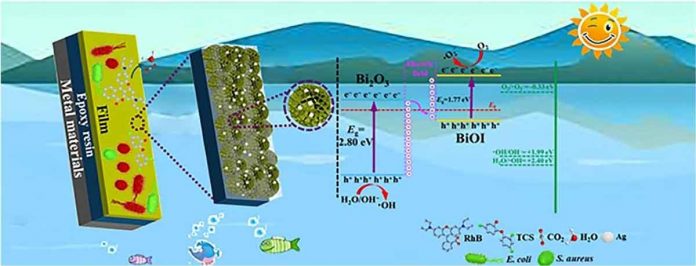Various photocatalyst powders can remove contaminants and microorganisms from water efficiently. But their practical application is limited due to poor recovery performance.
Previous studies used magnetron sputtering and electrodeposition to obtain the bismuth-containing seed layer for bismuth-based photocatalytic film hydrothermal in-situ grown onto various substrates. This process is sophisticated and energy-consuming.
Institute of Oceanology of the Chinese Academy of Sciences (IOCAS) scientists provided a kind of novel epoxy resin mediate layer for hydrothermal in-situ grown photocatalyst onto various metals. The study was published in Separation and Purification Technology.
Scientists found that the photocatalytic film with similar flower-like morphology could grow onto epoxy resin–coated metals. The epoxy resin intermediate layer exhibited a distinguishing functionality of this work.
The dipole-dipole interactions between the stabilizer polyvinyl pyrrolidone (PVP) and epoxide group of epoxy resin were conducive to form the photocatalytic film of hydrothermal in-situ grown active sites. Dissolution-recrystallization processes occurred at the edge of the newly formed nano-sheets. These nano-sheets were continuously stacked and assembled. A flower-like microsphere film was gradually formed layer upon layer on metals.
The film showed similar photocatalytic activity, by contrasting with powdered bismuth-based photocatalyst. It indicates that the transformation from powdered photocatalytic to film can maintain good photocatalytic activity.
Inducing epoxy resin as the media layer that substitutes bismuth seed layer is simple and convenient.

